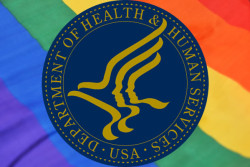
The proposed rule does make some significant strides, particularly for transgender people. For example, no longer can health insurance plans categorically deny coverage for transition-related care, and health care facilities will have to respect patients’ gender identity. More importantly, in keeping with recent trends in federal law, the rule proclaims that discrimination in health care based on gender identity is by definition sex discrimination. This is incredibly significant in the first-ever federal regulation against sex discrimination in health care.
However, as proposed, the rule doesn’t include sexual orientation within the definition of prohibited sex discrimination. This omission is a problem and is not consistent with where federal law is going in other areas, like employment and education. In addition, HHS is considering creating a religious exemption to these critical protections – something that would be harmful and dangerous for LGBTQ people and other individuals seeking reproductive health care services.
On November 9th, our federal policy team submitted a comprehensive set of recommendations to HHS asking them to address our concerns. In the recommendations we applauded the agency for the progress that the rule will bring about in so many important areas, but also suggested some essential improvements necessary to ensure that the rule will fulfill its promise.
Backed up by in-depth analysis of the law, and illustrated poignantly by compelling stories from our litigation docket and Help Line calls, we argued that the rule should in fact include sexual orientation within the definition of sex discrimination, and that HHS should reject the idea of allowing some health care providers and insurers to continue discriminatory practices in the name of religious beliefs. We also advocated for broadening the scope of the rule so that it covers programs of other federal agencies in addition to HHS, and for making sure that the rule’s provisions also protect reproductive health care providers from discrimination.
LGBTQ people still face a wide array of mistreatment in the health care system due to homophobia – from being ridiculed and reprimanded in the doctor’s office, to being denied access to a critically ill loved one, to being denied treatment altogether. The protections contained within this all-important new health care nondiscrimination rule will go a long way toward ending these types of injustices which too often occur to the most vulnerable people in our community.
We are hopeful that the new rule will be finalized and go into effect during the first half of 2016. In the meantime, NCLR will continue to advocate vigorously for the broadest and most robust protections for the LGBTQ community in health care and beyond.









